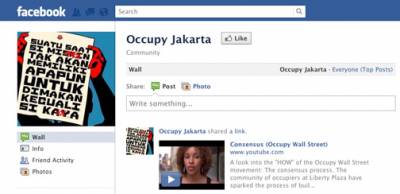M.A. Candidate, Department of Anthropology
Hunter College, CUNY

As the Occupy Wall Street movement went global, social movement activists in Indonesia adopted an Occupy discourse, in part, through creation of and participation in Facebook groups. These groups afforded opportunities for Indonesian Facebook users participating in local activism online to join the globalizing Occupy movement within a familiar activism framework. Despite a history of colonial occupation, Indonesian cyberactivists embraced an expanded meaning of the word occupy as they joined a global social movement and formed local Occupy communities of practice. Through ethnographic fieldwork in collaboration with Indonesian and other involved actors, this study asks: What constitutes an occupation for online participants in the Indonesian Occupy movement?
Beginning in October 2011, I joined Indonesian Occupy Facebook groups mobilized around Jakarta, Indonesia and became 'friends' with their creators, members and administrators. I recorded and analyzed images, texts, links and group descriptions, and engaged in conversations and interviews with group members. I use this data to map the terrain of the Indonesian Occupy movement on Facebook in terms of the interplay between Occupy discourse (both global and local) and the narratives of activists in posts, discussions, links and images. By making Facebook group members my object of study, I investigate the global reach of the Occupy discourse and the emergence of its local forms in the practices of online Indonesian activists. In my analysis, I trace the Facebook groups' use of Occupy discourse around and through histories of colonial occupation in Indonesia. I find that social movement activities in Facebook groups were not shadows of physical Occupy movement activity but were acts of resistance, of occupying, in themselves.
This study shows that when the online engagements of actors in the globalizing Occupy movement are ignored or assumed to be identical to those of Occupy Wall Street, the textured terrain and localism of the movement are leveled. Like the occupation of a public-private square, occupation of online space involves frictions with boundaries, legal lacunae, privatization, and surveillance. Users engaging in political action on the cyberspatial plazas are negotiating local barriers to participation as well as transnational aspects of the globalizing Internet. The privileging of the physical occupation as what 'really matters' acts to erase the voices of those who engage in social movements online in political-legal environments where the stakes of physical action are high.
Publications arising from this project:
Oman-Reagan, Michael P. 2013. Occupying Cyberspace: Indonesian Cyberactivists and Occupy Wall Street. M.A. Thesis, Department of Anthropology, Hunter College, City University of New York.
Oman-Reagan, Michael P. 2013. Occupying Cyberspace: Indonesian Cyberactivists and Occupy Wall Street. Paper presented at the Annual Meeting of the American Anthropological Association, Chicago, November 22.
Oman-Reagan, Michael P. 2012. Occupying Cyberspace: Indonesian Cyberactivists and Occupy Wall Street. Critical Quarterly 54(2): 39-45.
 Close
Close

